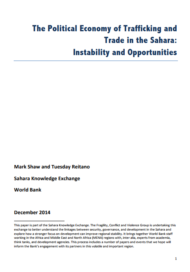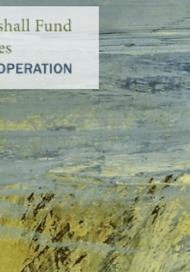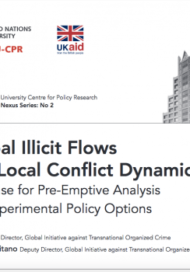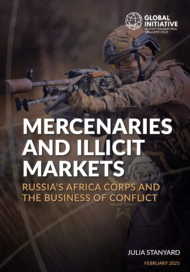Posted on 11 Dec 2014
Mark Shaw and Tuesday Reitano of the Global Initiative Secretariat were invited to contribute to the World Bank’s Saharan Knowledge Series with a paper, “Instability and Opportunity: illicit trafficking and trade in the Sahara“, which analyses the interaction between illicit and licit forms of trade and their impact.
In the last two decades, a number of countries of the Sahara region have undergone fundamental changes to their political and economic profile, which in turn have impacted the stability and development of the region. The pace of this evolution appears to be accelerating, as trends such as globalization and the spread of ideological movements impact on and engage with local dynamics. The economies of the region, and particularly those of the oil rich states, remain largely undiversified, and the structural conditions of those states have done little to promote equal distribution of wealth or multi-sectoral growth. The conditions that have driven conflict or political instability are still in place – but now newly fledged governments have few tools to contain conflict or pressure from localized interests. Zones of fragility are expanding, and increasing numbers of non-state actors are challenging longstanding norms of governance and state consolidation and in several cases the geographic borders of states themselves. This is set to continue and will both impact upon trafficking and trade in the wider region and in turn be shaped by these phenomena.
Old and new trends
Understanding how patterns of licit and illicit trade are impacting upon political developments in the Sahara have become critical to creating conditions for security, development and economic growth. Several developments have had an important impact in forming emerging licit and illicit trade patterns, and the interaction between them:
- Although long-standing, inter-regional trade driven by a thriving informal economy with significant levels of cross border smuggling based around subsidized price differentials for commodities between oil producing states and their neighbours, this has flourished as a result of the greater political instability and conflict. This applies in particular to trade from North African states to communities along their southern borders.
- The increasing dominance of sea-borne trade, and the subsequent development of West African port infrastructure as a staging post for wider regional trade; the result is that goods in the south Sahara can be supplied without the requirement to traverse the Sahara from the north.
- The introduction of high value illicit goods (most notably cocaine) as a transit trade through West Africa in the early 1990s. This co-mingled with already established West-East trafficking in hashish to create highly lucrative drug corridors, but in a context where state control has eroded, arms are freely available and security must be bought.
While each of the factors above have shaped the emerging nature of trade and trafficking in the region the question of wider insecurity in the region is having a profound impact.
Current evidence suggests that these two trends have combined, with the result that very little (if any) licit trade now traverses the Sahara. Legal commodities through the formal economy can be easily supplied or extracted through sea ports, which have proliferated around the coastline particularly in West Africa. The informal economy is thriving, particularly in the framework of increased political instability, with significant levels of cross border smuggling based around subsidized price differentials between oil producing states and their neighbours. However, for reasons of necessity: a requirement for secrecy in the case of drugs, and desperation in the case of human migrants, it is now almost exclusively illicit goods that completely traverse the Sahara in any direction.

When protection is a commodity
As a consequence of both the growth in illicit trafficking in drugs and the erosion of state capacity to project itself into its borderlands, sophisticated protection economies have developed along the high value trafficking routes. Not unique to the Sahara, protection economies emerge in the absence of effectively functioning state institutions, when protection itself becomes a commodity. But protection can be expensive and its costs increase when applied to high value commodities such as drugs.
The increased costs of protection for trans-Sahara trade, combined with lower costs of meeting the needs of communities on the borders of the Sahara, have contributed to crowding out the legitimate economy and there is evidence that it has dampened the capacity for informal trade beyond immediate neighbouring borders, particular in the north where subsidies still ensure the possibility of a profit. It is now almost exclusively the trafficking of illicit goods – drugs, arms and migrants – that traverse the Sahara itself, from north to south or east to west.
Thus, the fight against illicit trafficking and fragility in the Sahara are closely interwoven.
Gains are being distorted, diverted and lost by the strength of the illicit economy, and if peace building and state consolidation are to be achieved then the problem of illicit trafficking needs to be reframed from beyond a security lens, to instead understand and break down the economic and political incentives that are enabling illicit trafficking and the informal economy.
The various groups enriched by illicit trafficking or able to control a protection economy take different characteristics and engage at differing levels with state institutions, but in all cases those accumulating resources controlling or protecting regional illicit flows have little or no incentives to support the consolidation of good governance or state control. Close examination shows that these groups are more likely to challenge or undermine the stability and legitimacy of the state, or to seek opportunities presented by democratic transitions to use illicit resources to gain further influence. In some key regions the protection economy has come to dominate legitimate markets and regulated trade, such that all flows – both licit and illicit – become subject to the controls of the protection economy, and enrich those groups that control it.
Policy responses
A reinterpretation of the common assumptions about Saharan trade and community dynamics on this basis has significant implications for the policy response needed to consolidate and extend state reach, and for the strategy of providing incentives for illicit activities. The default policy of drawing those engaged in illicit trade more closely into the political process is likely to further consolidate and incentivize their illicit activities and corrupt the state-building process, rather than reinforce positive state consolidation in the interests of the broader population.
Similarly, the alternative interpretation that is predicated on the binary notion that the state must be strengthened to combat insurgents and traffickers will equally be ineffective. Instead, this report demonstrates that the reality is more complex. With the endemic levels of corruption and the interweaving of trafficking groups into the state, and the state into the protection economy, the interests of the two groups may not be distinct. State officials may follow economic, social, and political incentives not congruent with the interests of central state consolidation, indicating that the problem is less technical than political. With that lens, the knee-jerk response to strengthen the capacity of law enforcement and state security institutions, or to provide more technology, surveillance materials, vehicles, and capacity-building, may empower the protection economy rather than the state.
To undercut the protection economy and create a positive dynamic that supports state consolidation and human security for communities in the Saharan periphery, there is a requirement to delink armed groups from the protection economy. Both political and economic interventions will be required in tandem, which reduce the prevalence of and access to small arms and weaponry, but at the same time provides political accommodation, and agreements around creating shared commitments towards the provision of socio-economic goods.
The need to explicitly address corruption is essential. Across the Sahara, where the state is present at all, it is increasingly perceived as corrupt and illegitimate. Arguably, this slow erosion of the state is a more potent and damaging form of fragility than the overt consequences, as it creates a quicksand of the foundations of governance, the rule of law and democracy. Furthermore, as the international community concentrates its focus on state institutions and the formal processes of democratic elections at the expense of community level interventions, this serves both to enable those enriched by criminal proceeds and to multiply the perceived tacit endorsement of the trafficking economy.
In the long term, a strategic and harmonized process needs to be applied to tackle informal trade and informal economies. Given the entrenchment of these economies and the establishment of strong networks of protection, this cannot be achieved through a punitive (i.e. sanctions based) or heavily regulatory approach. A range of tools can be brought to bear, including experimentation with taxes, tariffs and subsidy policy, and rationalisation is required across the region within a context of political accommodation for those groups in the border areas most affected.
Over time, and congruent with the broader socio-political and structural interventions, there will need to be an effort to bring the state back into those regions where its reach has not been felt, and ensure its capacity to control, regulate and secure livelihoods and communities. The informal economy maintains its traction at the community level because of the paucity of other alternatives. An over-arching framework needs to be applied in a crime sensitive manner to development and economic priorities which recognize the dynamics of the informal economy, make the structural reforms required to bolster the resilience of communities, provide a broad-based, pro-poor redistribution, and that create viable alternatives to those communities and population groups most at risk.




